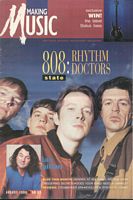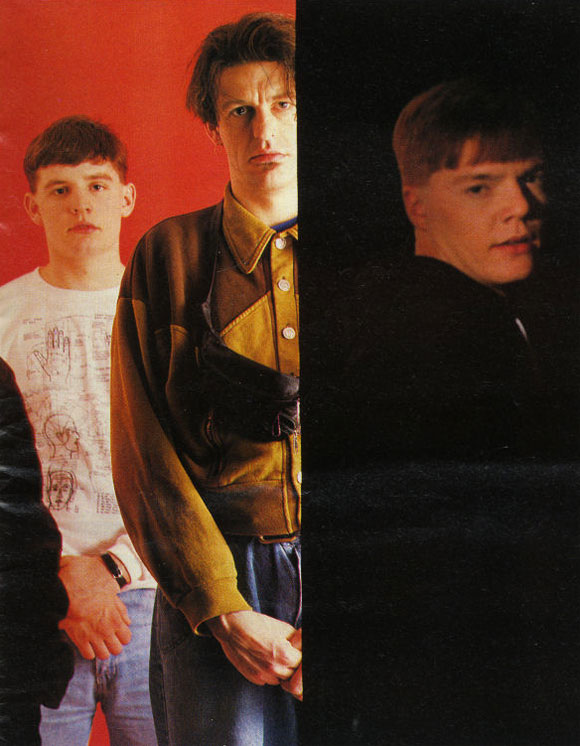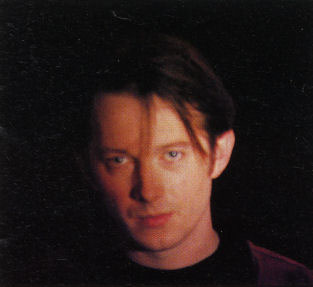Solid State |
|
 |
Making Music August 1990 Page: ?? |
 Dance music is big business as more bands discover you don't have to have a guitar to express yourself. But some people have known that all along...808 State tell Paul Quinn what the world's like when everyone else catches up. CALL THE COPS. Mancunian dance masters 808 State are currently to be found whacking the pop charts around the head and body with some rib-bruising sub-bass, while accomplice MC Tunes sets his rottweiler rhymes on a dazed public. Aside from predictable old muso mumblings about it being "not proper music", 808 State represent one side of a new rivalry - between authentic and crossover dance music. 808 State are: Martin Price, Graham Massey, Darren Partington, and Andrew Barker. Price has been involved in electronic and dance music since the mid 1970s, both making it with 808 State and selling it through his Manchester record store. He's more than a little cynical about the rash of recent converts to the dance scene. "It's only in this last year that the barriers have started breaking down between indie pop and dance music. And I don't think it's altogether good. All the people who were telling me, four years ago, that the music I was playing was shite, that it was washing machine music, I've seen all along that they're open to whatever the music press is telling them, to whatever is happening now. It's no surprise to us that dance music has come to the fore: it's always been there for us, from when it was an underground thing. And when it's forgotten in a few months time, and all the people in the indie crossover bands have stopped making records with Andy Weatherall, it'll still be there for us. "I respect people like Morrissey and Ian McCulloch for saying that they still believe what they believed in two years ago, and they're still going to make the kind of music that is inspiring for them. They're not going, 'Here you are, DJ...' "There's indie bands saying that because they've taken Ecstasy, their whole lives have changed, and now they're into dance music - I mean, how shallow can you get? They're still an indie band, still playing to their normal fans, and they're milking our scene. It's the record companies that tell these bands they've got to have a dance single, just to get their faces seen. And it begins to register that the bands are not even in their own records any more." Darren Partington, like Barker, an active club DJ, agrees: " People say you've got to let bands progress and move on. But they're not progressing - someone else is progressing for them." The worry is that the people currently making money out of the dance scene won't be putting any back when it dies down. "No-one's standing up for our scene." SNORE PATROL 808 State have persistently proved that they won't be pushed around. Price quotes an example: "The record company said that they thought 'Pacific State' (The band's major hit from early this year) was like Acker Bilk's 'Stranger on the Shore' - they felt it could only succeed in that sort of environment, because that's what they know, that's the only way they can judge it. Half of them didn't even know it was a saxophone. And their attitude was, 'Right, when's your next one like that coming out?' And we go, 'Oh no, sorry - this is what we're going to do next,' and introduce them to MC Tunes. "We won't stick to a formula. We're in the charts now with a hard-core rap record (top ten single 'The Only Rhyme That Bites') which is one of the hardest singles around. People down in London are saying that it's too fast to be cool and stuff, but we don't take much notice - we watch it ripping up dance floors everywhere we go..." So how is your average 808 State track put together, then? Darren explains. "No-one has the track planned out in advance. We just book the studio, go in, set up the gear, and click," he snaps his fingers, "you get your shit into gear. That's the immediacy of this band." Martin goes on: "We recorded 'Cubik' in twenty minutes, and mixed it in about two and a half hours." They're not into taking time off to seek solitude and inspiration. That's much too safe. "What it takes," says Price, "is a bit of pressure on you, a bit of excitement and a bit of danger." Partington adds, "A day a track, that's how we work it - one track recorded and mixed every day we go in the studio. You go out clubbing at the weekend, and all them influences are still in your head Monday morning - why wait a couple of weeks when you can put them straight onto tape?" FIGHT The immediacy doesn't end there, as Price again points out. "A friend of mine in Philadelphia was playing tapes of 808 State singles in his club before they were released - people there were grooving to something that came out of our heads literally two days before. That's what I love about this scene." But back to the nitty gritty. "We might start off just programming a simple rhythm, says Price, "which is not always the one we end up with - we do that afterwards - but you get a feel going. Everyone has a cassette with their own samples on it, and you have to fight to get your favourite bit in. "You make your own sounds from multi-sampling. Like the hard sound of the riff in 'Cubik' is five different pieces of noise sandwiched together. We never take the easy way out." "Bassline sounds too," says Partington; "you keep striving to get a better one, combining four synths into one sound. We know that people who buy our records appreciate our sounds, just like we do other people's. When we hear a sound that's not a pre-set on a Casio or a Yamaha, we know someone's striving to find something new..." "I wouldn't rule out any influences at all," Price insists. "You can use something from the 1812 overture and it's instantly modern. There's no limitations. I mean, I use things I hate, as a form of exorcism. I'll sample a record I've hated all my life, and put it into a track and make it into something that's really good." (The recent single, of course, featured that nifty strings sample from the soundtrack of the Big Country movie.) But they do have sampling codes of conduct, states Partington: "We won't plagiarise a whole track - we won't rip someone else's work. We'd maybe use tiny little pieces." You do get the impression, listening to an 808 State record that this is very much a snippet, a sampler, if you'll pardon the expression, for their live club shows. To me the turntable is an instrument," says Darren. "People are now classing DJs as musicians, and I appreciate that." Price puts it more broadly: "The studio is our instrument: to go out live is really difficult with House music. There's a lot of different ways to do it, and we've done them all." At the moment what they do is half live and half backing tape, which includes an extra sync track to keep all the live stuff together. They know how precarious it is to do the whole lot live, putting your faith in fragile MIDI leads and disk-drives. Says Partington, "A drum machine doesn't belong on a stage, it belongs in the studio." "I didn't want 808 State to do gigs," admits Price, "but we have to promote ourselves. I like doing them, but I think it's pandering too much to the British scene. Audiences have been brainwashed, programmed theatrically to look at the stage. They even dance facing it..." "And they stop and clap," Partington adds; "we don't want that. If you're moving, dancing, that's better than any whistles or applause." Price sums up the dance music ethic:" If someone's dancing, you know the person's enjoying themselves, and when they go home they'll think, 'That's one of the greatest nights I've ever been to.' If you want to achieve mediocrity, then just go on the circuit like all the bands do."  I rest my case.. The band's grievous bodily hardware has been known to include (other than the obvious TR808 drumbox): two more Roland rhythm machines - a TR909, and the more advanced Human Feel R8; an MC202 - early Roland Microcomposer; a TB303 Bassline; a collection of old Roland SH101 mini portable keyboards; and a Roland...no, hang on, a Casio (well, well) FZ1 sampling keyboard. Sequencing on the last album was done with SMPTE Track on an Atari 1040ST (for the gear with MIDI) and an old Korg KMS30 sync -box (for the rest). Aside from the usual studio rack-mount effects, they like to grunge things up a bit through some old MXR and Bass footpedals. |
|